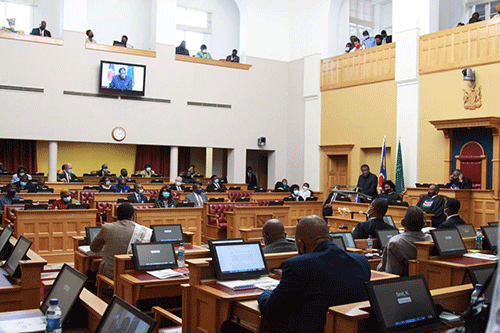Opposition parties represented in the National Assembly have asked the Windhoek High Court to urgently hear their application to declare the appointment of the newly appointed Anti-Corruption Commission heads and commissioners of the Electoral Commission of Namibia as illegal.
Members of the National Assembly and the nation at large were not afforded an opportunity to properly debate and assess the fitness of the nominated candidates, said Popular Democratic Party (PDM) lawyer Elize Angula during oral arguments in the High Court yesterday.
PDM, alongside All People’s Party (APP), Rally for Democracy and Progress (RDP), Republican Party of Namibia (RP), National Unity Democratic Organisation (Nudo), Namibian Economic Freedom Fighters (NEFF) and South West Africa National Union (Swanu) approached the court on an urgent basis, seeking an order declaring President Hage Geingob’s decision to call a special session for the National Assembly to discuss the appointment of ECN commissioners and ACC directors as unconstitutional.
The parties also seek to have the court set aside the appointment of Elsie Nghikembua, Joram Rukambe and Emmerentia Leonard as ECN commissioners as well as the re-appointment of ACC director general Paulus Noa and his deputy Erna van der Merwe.
In addition, they seek for the court to compel the head of state to direct by proclamation a fresh sitting of the National Assembly for a special session to discuss the appointments at ECN and ACC.
Last month, the August House approved the nominations and appointment of ECN and ACC heads amid huge resistance from members of the opposition parties, who later staged a walkout, claiming the procedure was illegal.
In yesterday’s court hearing, the parties argued why the matter should be heard as one of urgency.
In delivering her argument, Angula said the urgency was created by the President when he sought to extend the sitting of the special session by amending the Proclamation 38 and gazetting it on the same day as the sitting directed by it.
It is their argument that although the President is empowered to amend a proclamation directing for a special sitting of the NA, he is, however, not authorised to do so after he has already directed the special session and after the House became vested with the business so directed.
In doing so, according to Angula, the President interfered in parliamentary business – contrary to the Constitution.
Angula argued the parties tried to seek internal remedies by highlighting their grievances in a letter directed to NA speaker Peter Katjavivi, which to date they are yet to receive a response.
Furthermore, the parties were not given ample time to determine the validity of the sitting.
“If the appointed and nominated candidates were appointed at an unlawful sitting in an unlawful manner, they cannot assume office and such assumption of office is vitiated by illegality, rendering their actions as officers in those positions illegal and unlawful. There is simply no substantial redress in due course from such illegality and unconstitutionality,” said Angula.
In response, Vincent Maleka, who is representing Katjavivi, Geingob and attorney general Festus Mbandeka, said the parties have not made out a case for why their matter should jump the court’s queue, and they have also failed to meet the requirements applicable for urgency.
“The applicants ought to have taken urgent steps prior to the National Assembly, taking its decision on 29 July 2021. However, once the vote was taken, the horse had bolted and any urgency asserted by the applicants was lost,” argued Maleka.
Maleka said after the NA took its decision to make the appointments, those appointed commenced office on 1 August 2021 and have since taken various decisions and performed their functions.
If the parties were aggrieved, they should have taken an internal remedy.
“We accordingly submit that the application must fail on the basis that the applicants had an internal, primary and effective remedy, which they failed to invoke and have, contrary to the Supreme Court’s judgment, not explained why they should be entitled to seek relief from this court, notwithstanding the remedy available to them,” said Maleka.
Judge Collins Parker will give a ruling on urgency on 30 August.
- mamakali@nepc.com.na
Parliamentary standoff… The National Assembly in session.
Photo: File


